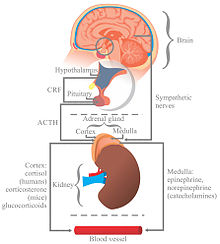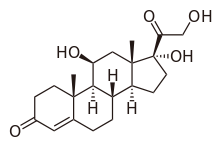User:Kholography1118
Stress
[edit]Introduction
[edit]
The term 'Stress' is used in many contexts and tend to have various meaning.[1] The most common definition of stress is a series of biochemical reaction (or constant feedback between stressors and responses) caused by absence of homeostasis, which is a mechanism to maintain physiological systems.[2] In the context of societal usage, stress is usually defined as the attempt to cope with pressure from external factors and its overall implications involving negative emotions.[3]
Types of Stress
[edit]Types of stress are primarily categorized into 2 types by its implications and consequences on time.[4]. Acute stress has immediate effects for living organisms, being often expressed by a phrase 'fight or flight'. On the contrary, chronic stress is about over-simulation or predictability for expected danger on future.[4] Anxiety means a synthetic feeling such as worry, unease, or fear and could be considered as the extension of chronic stress.[5] Underlying mechanism for these actions are upon the expansion or shrinkage of the hormone called 'Glucocorticoids', affecting memory formation.[6]

Causes of Stress
[edit]
According to the formal definition of stress, stressors are main contributors to generate stress. There are many sorts of stressors, and it varies on the context. For example, environmental concerns are climate change, pollution, over-harvesting natural resources.[7] Societal concerns are, on the other hand, economic pressure, socio-political conflicts.[8] In the reductionist point of view, such as psychological context, stressors are some kind of hormone affecting how living organisms to deal with physical circumstances.[1]

Physiological Stress Response
[edit]According to empirical evidence, specific types of hormones that are often indicated as 'two arms of vertebrate stress response' cause the stress itself.[9] Catecholamines like dopamine, epinephrine are neuro-transmitters generated by nerve cells, and increase heart rate and blood pressure for 'fight-or-flight response'.[10] Glucocorticoid hormones such as cortisone, dexamethasone, hydrocortisone metabolic hormones contributing mobilizes energy stores for immediate survival.[11]
Effects of Stress
[edit]
Stress has two ambivalent effects for human health. In short-term, it is highly effective to handle immediate threats for survival. However, the stimulation caused by pressure would not be sustainable for most cases; thus it also has harmful effect in the long-term.[12]
References
[edit]- ^ a b Fink, G. (2016), "Stress, Definitions, Mechanisms, and Effects Outlined", Stress: Concepts, Cognition, Emotion, and Behavior, Elsevier, pp. 3–11, ISBN 978-0-12-800951-2, retrieved 2024-09-18
- ^ Koolhaas, J.M.; Bartolomucci, A.; Buwalda, B.; de Boer, S.F.; Flügge, G.; Korte, S.M.; Meerlo, P.; Murison, R.; Olivier, B.; Palanza, P.; Richter-Levin, G.; Sgoifo, A.; Steimer, T.; Stiedl, O.; van Dijk, G. (2011-04). "Stress revisited: A critical evaluation of the stress concept". Neuroscience & Biobehavioral Reviews. 35 (5): 1291–1301. doi:10.1016/j.neubiorev.2011.02.003. ISSN 0149-7634.
{{cite journal}}: Check date values in:|date=(help) - ^ Hobfoll, Stevan E. (1998). "Stress, Culture, and Community". doi:10.1007/978-1-4899-0115-6.
{{cite journal}}: Cite journal requires|journal=(help) - ^ a b McGonagle, Katherine A.; Kessler, Ronald C. (1990-10). "Chronic stress, acute stress, and depressive symptoms". American Journal of Community Psychology. 18 (5): 681–706. doi:10.1007/bf00931237. ISSN 0091-0562.
{{cite journal}}: Check date values in:|date=(help) - ^ Ross, Rachel A.; Foster, Simmie L.; Ionescu, Dawn F. (2017-02). "The Role of Chronic Stress in Anxious Depression". Chronic Stress. 1: 247054701668947. doi:10.1177/2470547016689472. ISSN 2470-5470. PMC 7219927. PMID 32440578.
{{cite journal}}: Check date values in:|date=(help)CS1 maint: PMC format (link) - ^ Sauro, Marie D.; Jorgensen, Randall S.; Teal Pedlow, C. (2003-12). "Stress, Glucocorticoids, and Memory: A Meta-analytic Review". Stress. 6 (4): 235–245. doi:10.1080/10253890310001616482. ISSN 1025-3890.
{{cite journal}}: Check date values in:|date=(help) - ^ "strategics, n.", Oxford English Dictionary, Oxford University Press, 2023-03-02, retrieved 2024-09-18
- ^ "Understanding Fragility", Societal Dynamics and Fragility, The World Bank, pp. 11–22, 2012-10-12, ISBN 978-0-8213-9656-8, retrieved 2024-09-18
- ^ "Editors' Overview Development, Stress and Relationships", Adolescent Stress, Routledge, pp. 15–20, 2017-09-29, ISBN 978-1-315-08302-5, retrieved 2024-09-18
- ^ "INTRODUCTION TO BRAIN CATECHOLAMINES AND STRESS", Catecholamines and Stress, Elsevier, p. 7, 1976, ISBN 978-0-08-020588-5, retrieved 2024-09-18
- ^ Angelier, Frédéric; Wingfield, John C. (2013-09). "Importance of the glucocorticoid stress response in a changing world: Theory, hypotheses and perspectives". General and Comparative Endocrinology. 190: 118–128. doi:10.1016/j.ygcen.2013.05.022. ISSN 0016-6480.
{{cite journal}}: Check date values in:|date=(help) - ^ Dhabhar, Firdaus S. (2014-05). "Effects of stress on immune function: the good, the bad, and the beautiful". Immunologic Research. 58 (2–3): 193–210. doi:10.1007/s12026-014-8517-0. ISSN 0257-277X.
{{cite journal}}: Check date values in:|date=(help)
